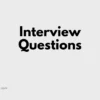Executive Level Interview Preparation
Executive Interview Preparation Tips
Preparing for an executive interview involves several key strategies:
- Do your research: It is important that you take the time to thoroughly research the company you are interviewing for. Knowing as much about the company, as well as the people you will be interviewing with, is very important. This shows that you are serious about the position. It can also help boost your confidence during the interview by allowing you to have the required knowledge about questions you might be asked.
- Enhance your digital presence: This is crucial as executive candidates are scrutinized more thoroughly than others.
- Study and prepare for executive-level interview questions: Being prepared for a variety of plausible questions that you may be asked during your executive interview will help you feel and come across as confident. Common questions may include:
- What are your strongest traits?
- How would you describe our company?
- Why do you want to work at our company?
- What is your management style?
- What would the first 30 days look like if given the job?
- How do you reward your employees for adequate and exemplary work?
- What challenges have you faced as a leader?
Preparing answers to these questions can help you navigate your responses with confidence.
- Deliver your introduction with confidence: Your initial introduction upon arrival to an executive interview can help set the tone for the rest of the interview. You should arrive at the interview at least 10-15 minutes early. Be prepared with a copy of your resume as well as any other important paperwork and information. When introducing yourself to the interviewers, make sure you make eye contact, shake hands, and use your first and last name.
- Ask questions: Don’t just answer the questions you are asked. Most interviewers will end an executive-level interview by asking if you have any questions about the company or job position. This is also a great opportunity for you to gauge if the position and company is a good fit for your own skills and professional goals. Come prepared with a few specific questions to ask at the end of the interview that will both showcase your interest in the position and help you decide if it is the right fit for you. Thoughtful questions to ask might include:
- What are some of the biggest challenges you think I’ll face in this role?
- What skills would you like the successful candidate to have?
- Follow-up after the interview: To remain on top of the interviewer’s or recruiter’s list, send a thank you mail once you have completed your final interview with senior management. The mail should emphasize your excitement and appreciation for the opportunity and should also include a thank you to the interviewers for their time.
Finally, be ready to show off specific accomplishments and make the interviewers picture a future with you. It’s important to make it personal and research the people you are interviewing with.
Behavioral Questions for Executives
Executive interviews are often more difficult (and costly!) and you’ll require a senior recruiter or other senior executives within your company to help make the best decision possible. While you’re still able to use some core concepts in interviewing such as behavioral-based interview questions, you’ll definitely want to tailor them to the executive level.
Behavioral interview questions for executives can include questions about leadership, adaptability, and vision:
- Leadership: ‘Tell me about a time you led a project’ or ‘What is your leadership style?’
- Adaptability: ‘Describe a time when you had to adjust to changes over which you had no control’ or ‘What do you do when priorities change quickly?’
- Vision: ‘What do you think our company’s mission and vision are?’ or ‘What changes would you implement during your first year in the company?’
To evaluate experience, consider asking:
- Tell me about a time you dealt with challenging staffing issues. How did you handle it?
- Has there ever been a time you had to handle difficult financial issues? What did you do?
- Describe a time you faced an unforeseen issue on the job and how you diffused and resolved the situation.
Leadership and management interview questions to ask senior executives include:
- What did you like about the person’s management style?
- How do you keep your team focused?
- How would you describe your management style?
- Tell me how you have created a shared purpose among people who initially differed in opinions or objectives.
Here are some leadership behavioral interview questions:
- Tell me about a time when you and your team faced challenging odds. How did you keep them engaged and motivated to overcome the situation and succeed?
- Explain a time when you had to promote an idea or project to a group. How did you go about persuading them?
5 behavioral interview questions to help you screen for adaptability (Most Popular):
- Tell me about a time when you were asked to do something you had never done before. How did you react? What did you learn?
- Describe a situation in which you embraced a new system, process, technology, or idea at work that was a major departure from the old way of doing things.
- Recall a time when you were assigned a task outside of your job description. How did you handle the situation? What was the outcome?
5 behavioral interview questions to help you screen for culture adds (Most Popular):
- What are the three things that are most important to you in a job?
- Tell me about a time in the last week when you’ve been satisfied, energized, and productive at work. What were you doing?
- What’s the most interesting thing about you that’s not on your resume?
Behavioral interview questions to help you screen for collaboration (Most Popular):
- Give an example of when you had to work with someone who was difficult to get along with. How did you handle interactions with that person?
- Tell me about a time when you were communicating with someone and they did not understand you. What did you do?
Behavioral interview questions to help you screen for leadership (Most Popular):
- Tell me about the last time something significant didn’t go according to plan at work. What was your role? What was the outcome?
- Describe a situation where you needed to persuade someone to see things your way. What steps did you take? What were the results?
Good CEO interview questions:
- What do you think our company’s mission and vision are?
- What changes would you implement during your first year in the company?
- What would you do in your first 30 days as CEO of our organization?
- Who do you believe are our biggest competitors?
Behavioral Interview Questions To Assess Soft Skills include:
- Behavioral interview questions to help you screen for leadership: Tell me about the last time something significant didn’t go according to plan at work.
Key Interview Questions for CEOs
The CEO is the driving force behind a company’s strategy, culture, and overall direction. Asking the right interview questions ensures that the selected individual aligns with the company’s values, understands its challenges, and possesses the leadership qualities needed to steer the organization towards success.
Choosing the right CEO is pivotal for a company’s direction, culture, and overall success. Here are 10 essential interview questions to help identify the best candidates for this leadership role.
- Operational and Situational questions:
- What do you think our company’s mission and vision are?
- What changes would you implement during your first year in the company?
- What would you do in your first 30 days as CEO of our organization?
- How would you build a 5-year plan?
- Who do you believe are our biggest competitors? How do we differ from them?
- What do you think are the biggest challenges our industry will face in the next 5 years?
- What are the most helpful technological platforms and tools you have used? Would you implement them in our organization?
- What is the most innovative product or service you’ve worked on at a previous company?
- Describe your rationale before you make a big financial decision.
- What criteria do you use to decide which products or services to invest in?
- In 5 minutes, prepare a small pitch to present our company to a potential investor.
- Imagine that a product or service we launched recently failed our expectations. What are your next steps?
- Behavioral questions:
- What personality traits make a good leader?
- What is the best and the worst part of being a CEO?
- Name two strengths and two weaknesses you have and how they can impact your responsibilities as a CEO.
- What is the biggest challenge you have faced in your career? How did you overcome it and what did you learn from it?
- How do you prefer to communicate with your team to assign responsibilities to them?
- What’s your biggest challenge when it comes to people management?
- How would others define your communication style?
- Do you prefer to be close to your employees or maintain a healthy distance, and why?
- Describe a time when two team leaders or executives had a conflict. How did you handle the situation?
- Describe a time you had to make a tough decision (e.g. budget cuts, organizational restructuring, market withdrawal, etc.). What did you do and what was the result?
At Interviiews, we’ve compiled “125 CEO Interview Questions” (Chief Executive Officer Interview Questions), grouped by subject, to help you prepare for your next CEO-level interview. These CEO Interview Questions are specific to the CEO role, but you may also be asked general interview questions and Behavioral Interview questions, so we recommend preparing for those questions as well.
Furthermore, it is also important that you prepare a list of questions to ask during your interview. This will demonstrate your knowledge, show your interest, and allow you to learn what you need to know in order to determine if the position meets your job criteria and will be a win-win business arrangement for everyone.
- If you were hired, what would be your priorities in your first 90 days?
- How would you build trust, generate buy-in, and develop a plan during your first 90 days?
- How would you learn about our business?
- Describe how you have handled a challenging customer.
- Describe how you have resolved a conflict between leaders on your executive team.
- What challenges do CEOs face in our industry?
- Why do you want to work for our company?
- Why do you want to leave your current position?
Here are some good questions to ask a CEO in regards to their leadership:
- What are your thoughts on leadership?
- What makes a good leader?
- What do you think are the most important qualities for a leader?
- What do you think are the biggest challenges faced by leaders today?
- How do you develop and motivate your team?
- What do you think our company’s mission and vision are?
- What changes would you implement during your first year in the company?
- What would you do in your first 30 days as CEO of our organization?
- Who do you believe are our biggest competitors?
- Can you share an instance where you had to make a difficult decision with limited information?
- How do you handle disagreements or conflicts within your team?
- What are the company’s biggest strengths, weaknesses, and skill gaps?
- How would you describe your style of leadership?
- What interests you the most about the company’s future?
- What are the company’s top priorities over the next few years?
- How do you define success for this position?
High-Level Leadership Interview Techniques
Effective interview techniques for high-level leadership positions include:
- Crafting thoughtful questions: This is a crucial step in conducting effective leadership interviews.
- Assessing cultural fit: It is essential when hiring for high-level management positions.
- Utilizing behavioral interviewing: This helps in evaluating problem-solving skills and uncovering past performance.
- Preparing open-ended questions: This encourages in-depth responses from candidates.
- Dressing appropriately: Appearance matters in projecting professionalism.
- Delivering introductions with confidence: First impressions are important.
Furthermore, beginning and ending interviews professionally is essential. Additionally, the interview process for an executive-level position is much more elaborate and intense than for an entry-level job. Therefore, knowing how to successfully prepare for such interviews is crucial. Candidates should focus on effective techniques to identify high-potential executives.
Impactful Questions for Senior Roles
Best Practices for Executive-Level Interview Preparation:
- Anticipate questions that assess your leadership, decision-making, and problem-solving abilities.
- Use the STAR method (Situation, Task, Action, Result) to structure your responses.
- Provide concrete examples that demonstrate your competencies.
Common Questions to Prepare For:
- Why are you interested in the company?
- Describe your leadership style.
- Create core competencies.
- Evaluate employee performance.




